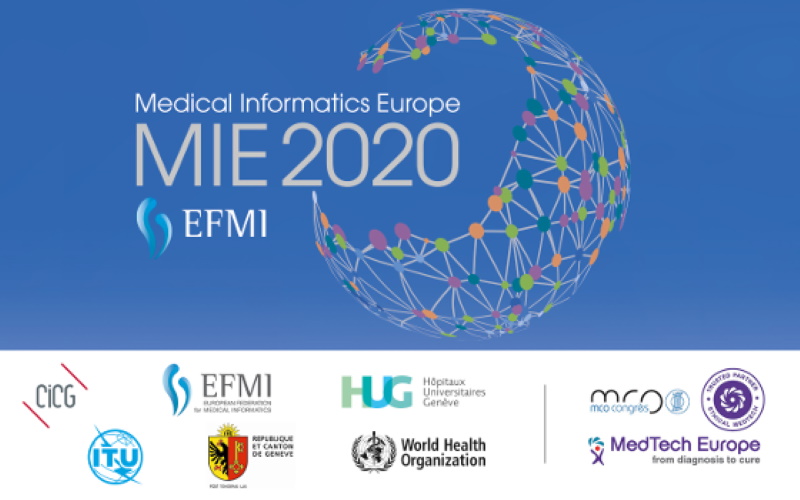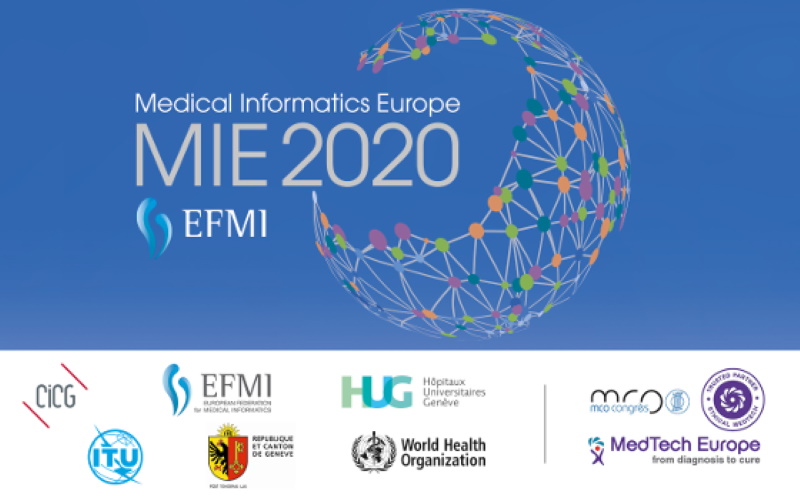28 April – 1 May 2020, Geneva, Switzerland.
The European Federation of Medical Informatics (EFMI) presents the 30th Medical Informatics Europe conference (MIE) at the Geneva International Conference Center (CICG). This conference is organized in partnership with the World Health Organization (WHO), the International Telecommunication Union (ITU), the State of Geneva (Geneva), the University of Geneva (UNIGE) and the University Hospitals of Geneva (HUG).
Medical Informatics Europe was already organized in Geneva in 2005. In the last 15 years, the worlds of medicine and information technologies have completely changed. Digitalization was seen as a nice to have in medicine, it is becoming a fundamental game-changer in the era of Digital Personalized Health and Medicine. Massive amounts of data from the molecular biology associated with massive data about the environment, behavior and lifestyle, exposition factors and personal records, the rise of unprecedented processing power and artificial intelligence have changed the face of medicine. The MIE2020 conference is a unique opportunity to meet experts from all involved fields, from deep learning or genomics, up to human factors, ethical and societal aspects. The MIE conferences not only attract senior researchers and top-notched experts of the field, but it is also, and mostly, a place where young scientists come to present their works, to meet peers, to network, to seek job and career opportunities.
In this 30th edition, MIE will have special tracks with European projects such as FAIR4HEALTH and standardizing organizations such as HL7 and SNOMED International to discuss the building of global frameworks to improve data usability to support life science research, cross borders, cross-systems, cross languages. Specific tracks devoted to encryption, blockchain, and privacy-conscious data sharing, along with ethical and legal experts, will investigate and propose a practical way to support innovation to alleviate the burden of diseases such as cancers or promote bio-surveillance networks for example.
Involving patients and citizens will also be at the center of the debates, along with some European projects such as CrowdHEALTH, patient organization, and patient partner groups, to discuss innovative ways to reach an active involvement and participation that can leverage the field.
And, of course, not to forget the prolific results of the public-private convergence, with the presence of the whole range of private partners, from young startups recently born from talented young entrepreneurs to global companies active in the field of life science and information technologies.
The conference main focus is “Digital Personalized Health” in a broad sense. The conference will cover all topics of digitalization in health.
Biomedical data, tools, and methods
- Data interoperability and data integration
- Semantics, controlled terminologies, ontologies, and vocabularies
- Information models and data representation standards
- Biomedical imaging and image analysis
- Signal processing
- Data visualization and interaction
- Augmented and virtual reality
- Encryption, privacy-conscious tools
- Natural language processing
- Artificial Intelligence, symbolic reasoning, machine learning
- Health data science, big data analytics
- Quality of data
- Evidence-based, reproducibility
- Ambient Assisted Living, Self-care application, Smart Cities and the Internet of Things
Supporting care delivery
- Individualized therapy
- Health information systems and evaluation
- Electronic health records/electronic patient records/personal records
- Nursing informatics
- Learning the healthcare system
- Clinical decision support systems and reasoning
- Clinical guidelines
- Telemedicine and telehealth
- Medical robotics
- Safety and security of health information systems and medical devices
- Simulation
Health and prevention
- Health-enabling technologies and sensors
- Telehealth
- mHealth
- Trusted health information
- Citizen-centered health
- Quantified Self and Personal Science
- Genomics and risk assessment
- Sustainability of health and care/crowdsourcing/social communities
- Health serious gaming
Precision medicine and public health
- Precision digital medicine
- Pharmacogenomics, biomedical genomics
- Translational Bioinformatics and Phenome Wide Association research
- Outcome research and evaluation
- Healthcare quality
- Patient safety
- Public health informatics
- Biosurveillance and biomonitoring
- Registries and health information exchange
- Health policy issues
- Disaster management
Human factors and citizen-centered digital health
- Human-computer interfaces and usability
- Education and capacity building
- Learning analytics for competence assessment
- Patient simulators
- Serious gaming
- Patient empowerment / engagement
- Social media, mobile apps, and patient portals
- Human factors and technology adoption
Ethics, Legal and societal aspects
- Policy
- Legal, ethical, and regulatory issues
- Privacy and consent management
- Health information literacy
- Workforce preparation, Capacity Building, and Team Science
- Public Trust and Citizen Engagement
Proposals for half or full-day pre-conference tutorials, conference workshops, demo, panels, podiums and industrial shows are welcome.
There will be special events such as science slam, startup race, innovation show which will be called for later.
Key Dates
- October 1st, 2019: Paper submission deadline
- December 1st, 2019: Author acceptation notification
- December 31st, 2019: Final version submission
- April 28th, 2020: Opening of the MIE 2020 Congress




